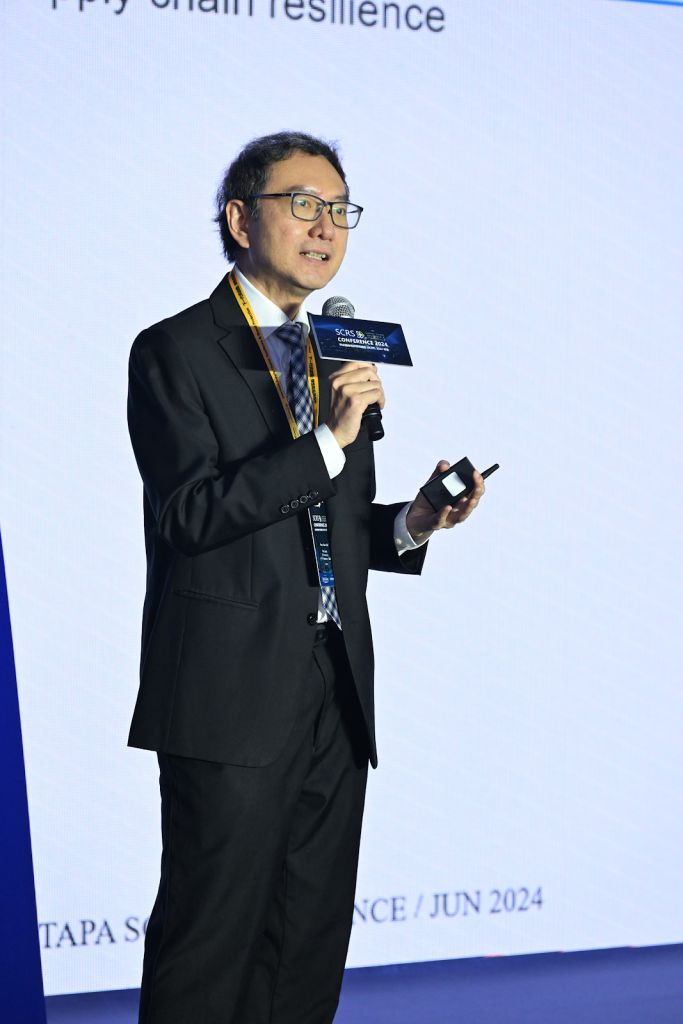SCRS Conference Day 1 Session #12
Supply Chain Digital Transformation and Innovation: Redefining Resilience in AI Era
By Prof. Goh Puay Guan, Associate Professor, Academic Director of the Multi-Disciplinary MSc in Industry 4.0, National University of Singapore (NUS)
At the Supply Chain Resilience and Sustainability (SCRS) Conference 2024, held in Shanghai, China, Prof. Goh Puay Guan, Associate Professor, Academic Director of the Multi-Disciplinary MSc in Industry 4.0 from the National University of Singapore (NUS) delivered a pivotal keynote. His address delved into how macroeconomic trends and technological advancements like Artificial Intelligence (AI) are reshaping the landscape of supply chain management.
Transported Asset Protection Association Asia Pacific (TAPA APAC), a leading global association for supply chain resilience and sustainability, organizes SCRS Conference and Awards Gala Dinner on an annual basis to gather delegates across the region in discussing the latest supply chain challenges and opportunities.
Prof. Goh articulated that the COVID-19 pandemic acted as a catalyst for profound changes, pushing organizations from a just-in-time approach to a more cautious just-in-case strategy. This shift is a response to the persistent disruptions in global trade, fluctuating freight rates, and stringent environmental, social, and governance (ESG) regulations. Organizations are now adopting a just-in-case mindset, focusing on business continuity planning and robust risk management. This shift is not merely a reactive measure but a strategic realignment towards greater resilience. The rise in freight rates, which have surged four to five times from pre-pandemic levels, exemplifies the economic pressures companies face. Such disruptions necessitate a reevaluation of traditional practices and a greater emphasis on flexibility and risk mitigation.
Physical Resilience and Technological Integration

Prof. Goh’s keynote addressed the dual aspects of resilience: physical and technological. On the physical front, companies are diversifying their supply sources and assessing the financial and operational health of suppliers to mitigate risks. This shift towards diversification reflects a broader trend of moving away from singular dependency on suppliers and towards building a more robust and adaptable supply chain.
Modern supply chains are also increasingly complex, extending across multiple modes and channels to operate on a global scale. This complexity introduces multiple areas where vulnerabilities can arise, potentially leading to disruptions or failures. To address these challenges, it is crucial to adopt an integrated approach to resilience. As Professor Goh emphasized, “We need to take care of these areas to remain resilient.” This involves not only robust business continuity planning but also the strategic integration of advanced technologies and ensuring physical resilience throughout the supply chain.
He presented data from a McKinsey survey illustrating that companies with advanced Industry 4.0 technologies were better equipped to handle disruptions compared to those with minimal technological integration. Technologically, the use of Internet-of-Things (IoT) devices has seen exponential growth. These devices provide real-time data, which is crucial for tracking and managing supply chain activities effectively. However, the increase in interconnectedness also introduces new challenges, particularly related to cybersecurity. Prof. Goh pointed out that as supply chains become more digital, the risk of cyber-attacks grows, necessitating advanced cybersecurity measures.
AI is another transformative technology that Prof. Goh discussed extensively. AI enhances decision-making processes by analyzing vast amounts of data to detect anomalies, predict potential disruptions, and optimize operations. For instance, AI-driven systems can expedite fraud detection by analyzing images and data more efficiently than manual processes. This capability is particularly valuable in sectors prone to counterfeiting and fraud, such as luxury goods and pharmaceuticals. Prof. Goh illustrated this with a real-world example of AI applications in detecting counterfeit products, showcasing how technology can significantly improve accuracy and speed in identifying fakes.
The Future of Supply Chain Innovation and TAPA Standards
In closing, Prof. Goh underscored that the integration of technology and the enhancement of physical resilience are not isolated endeavors but are interconnected aspects of a comprehensive strategy for supply chain management. As companies continue to navigate a complex and unpredictable environment, the adoption of digital tools and the development of resilient practices will be crucial. The ongoing evolution of supply chains requires a balanced approach that incorporates both innovative technologies and strategic planning to ensure long-term resilience and sustainability. Prof. Goh’s keynote provided valuable insights into how organizations can adapt to the AI era, emphasizing that the path forward involves not only embracing technological advancements but also rethinking traditional practices to build a more resilient supply chain infrastructure.
TAPA Standards play a pivotal role in assisting companies and supply chain in their digital transformation and technological adoption. TAPA Standards offering a framework that integrates advanced practices and the latest technological solutions for security, efficiency, and adaptability. By adhering to TAPA Standards, organizations can not only safeguard against emerging risks but also streamline their operations to achieve greater visibility and coordination across the supply chain. These standards guide businesses in leveraging technologies such as IoT, blockchain, and AI to enhance traceability, ensure data integrity, and mitigate potential threats.
As supply chains continue to evolve, TAPA Standards are redefining resilience through continuous improvement in its security requirements and innovation required to meet the requirements. Training tools and guidelines are also provided for members in their certification process. By aligning with TAPA’s global standards, businesses can build a more robust, agile, and secure supply chain, ensuring long-term success and resilience in an increasingly dynamic global environment.
To know more about TAPA Standards, visit www.tapa-apac.org or email info@tapa-apac.org
About the Speaker
Prof. Goh Puay Guan
Associate Professor, Academic Director of the Multi-Disciplinary MSc in Industry 4.0
National University of Singapore (NUS)
Prof. Goh is an Associate Professor at NUS, Academic Director of the multi-disciplinary MSc in Industry 4.0. He teaches Master’s level classes and executive education courses in supply chain management and technology innovation. He has helped to start the multi-disciplinary MSc Industry 4.0 program in 2019. Goh Puay Guan is also a book author, commentator, and industry guest speaker. He was also a Board Director at Flyoro; Advisor at Matex International, Bdata Inc and Log-hub AG; Mentor at Plug and Play APAC
Email: bizgpg@nus.edu.sg
Linkedin: https://www.linkedin.com/in/puay-guan-goh




